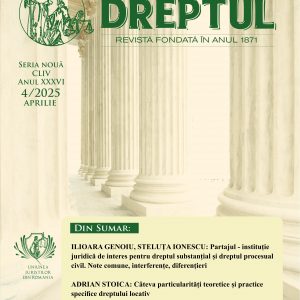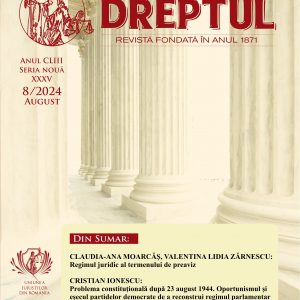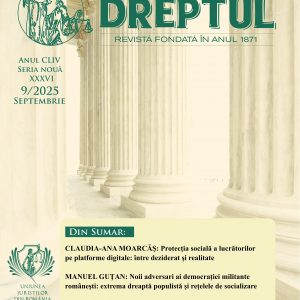-
 The new Romanian Code of Civil Procedure (Law no. 134/2010, as republished on 3 August 2012 and coming into force on the 1st of February 2013) supersedes the previous Code of Civil Procedure (of the year 1865) regulating (in articles 303-320) the witness-based evidence. In this study the author makes a wide-ranging analysis of this regulation, from the triple perspective of the admissibility, of the administration, of the appreciation of this mean of evidence, comparing the new provisions in this matter by those set forth in the previous Code of Civil Procedure.
The new Romanian Code of Civil Procedure (Law no. 134/2010, as republished on 3 August 2012 and coming into force on the 1st of February 2013) supersedes the previous Code of Civil Procedure (of the year 1865) regulating (in articles 303-320) the witness-based evidence. In this study the author makes a wide-ranging analysis of this regulation, from the triple perspective of the admissibility, of the administration, of the appreciation of this mean of evidence, comparing the new provisions in this matter by those set forth in the previous Code of Civil Procedure. -

-

-
 The problems of the land fund became of maximum importance after 1990. Romania, in relation to the new realities regarding the property, had to urgently adopt the Law No 18/1991. After more than 30 years of application, the Law on the land fund still gives rise to discussions on the topic of sharing the competence of the courts in matters of administrative acts issued in its application. The general framework in the matter of restitutions was completed by the appearance of the Law No 10/2001. Subsequently, the entry into force of the Law No 554/2004 has definitively established the legal regime of administrative acts in general. Therefore, we are at the confluence of several framework-laws in the field regarding the regime of administrative disputes, in general, and of the matter of the land fund, in particular. This study seeks to provide precisely an approach as analytical as possible of the manner the courts of law settle this issue.
The problems of the land fund became of maximum importance after 1990. Romania, in relation to the new realities regarding the property, had to urgently adopt the Law No 18/1991. After more than 30 years of application, the Law on the land fund still gives rise to discussions on the topic of sharing the competence of the courts in matters of administrative acts issued in its application. The general framework in the matter of restitutions was completed by the appearance of the Law No 10/2001. Subsequently, the entry into force of the Law No 554/2004 has definitively established the legal regime of administrative acts in general. Therefore, we are at the confluence of several framework-laws in the field regarding the regime of administrative disputes, in general, and of the matter of the land fund, in particular. This study seeks to provide precisely an approach as analytical as possible of the manner the courts of law settle this issue. -
 Juvenile deprivation of liberty is a controversial issue, in particular because the measure is in opposition to the educative goal of juvenile justice. Detention of children is a more acute problem. In Switzerland, although pre-trial – as well as administrative (immigration law) – detention of children under the age of 15 are prohibited, they are inappropriately decided by courts and authorities. The article describes the situation, its legal frame and has a critical look at such practice and decisions.
Juvenile deprivation of liberty is a controversial issue, in particular because the measure is in opposition to the educative goal of juvenile justice. Detention of children is a more acute problem. In Switzerland, although pre-trial – as well as administrative (immigration law) – detention of children under the age of 15 are prohibited, they are inappropriately decided by courts and authorities. The article describes the situation, its legal frame and has a critical look at such practice and decisions. -
 In the above study the author reviews the terms of contentious appeal – according to various assumptions regulated by Law no. 554/2004 against the urban planning certificate, appraisals or agreements served for the issue of the building permit by relevant authorities in the field of environment protection and water management. Key words: urban planning certificate; appraisals/agreements for the issue of the building permit by relevant authorities in the field of environment protection and water management; legal requirements; applicable laws.
In the above study the author reviews the terms of contentious appeal – according to various assumptions regulated by Law no. 554/2004 against the urban planning certificate, appraisals or agreements served for the issue of the building permit by relevant authorities in the field of environment protection and water management. Key words: urban planning certificate; appraisals/agreements for the issue of the building permit by relevant authorities in the field of environment protection and water management; legal requirements; applicable laws. -

-
 This paper is a critical analysis of the new regulations concerning the punishment, from the perspective of their compliance with the principle of individualization. It discusses, by turns, the issue of the significance of the principle of individualization, of the reasons that justify the existence of some general criteria of individualization and of the questionable significance of the current general criteria of individualization, included in Article 74 of the new Criminal Code.
This paper is a critical analysis of the new regulations concerning the punishment, from the perspective of their compliance with the principle of individualization. It discusses, by turns, the issue of the significance of the principle of individualization, of the reasons that justify the existence of some general criteria of individualization and of the questionable significance of the current general criteria of individualization, included in Article 74 of the new Criminal Code. -
 As a legal instrument of applying the principle of prevention, fundamental to environment law, preliminary authorizing polluting activities consists of an administrative act (permit) ruled by a special legal regime. It is based on assessing the environmental impact, it knows a special request, management and issuing procedure, and it establishes the conditions and/or parameters of functioning for an existing or new activity, having a potentially significant environmental impact. As an individual, real, regulatory act, the environmental authorization bears a complex version, in the shape of the integrated environmental authorization.
As a legal instrument of applying the principle of prevention, fundamental to environment law, preliminary authorizing polluting activities consists of an administrative act (permit) ruled by a special legal regime. It is based on assessing the environmental impact, it knows a special request, management and issuing procedure, and it establishes the conditions and/or parameters of functioning for an existing or new activity, having a potentially significant environmental impact. As an individual, real, regulatory act, the environmental authorization bears a complex version, in the shape of the integrated environmental authorization. -
 The Aarhus Convention (1998) organizes the exercise of public access to environmental information, taking part in decision making, and access to justice in environmental issues, as procedural safeguards of the right to a healthy and ecologically balanced environment. The effectivity of the right to environmental information bares significant limitations, both doctrinal and political, and has met several obstacles, mostly technical and cultural; such aspects concern especially the definition of environmental „information”, the conditions of accessing them, the exceptions, the administrative proceedings, the access to justice in this field and its results etc. In explaining its contents and amplifying the efficiency of this right a special part is played by the findings, conclusions and recommendations of the Compliance Committee for examining the enforcement of the Convention created in 2002 that can file complaints from Member States and non-governmental organizations, to evaluate, in a non-conflictual, non-judiciary and consultative manner, whether the treaty is correctly enforced by the Parties. Having no decision power, the Compliance Committee issues, following the examination, only a recommendation, addressed to the Reunion of Parties, that is always approved by the Member States.
The Aarhus Convention (1998) organizes the exercise of public access to environmental information, taking part in decision making, and access to justice in environmental issues, as procedural safeguards of the right to a healthy and ecologically balanced environment. The effectivity of the right to environmental information bares significant limitations, both doctrinal and political, and has met several obstacles, mostly technical and cultural; such aspects concern especially the definition of environmental „information”, the conditions of accessing them, the exceptions, the administrative proceedings, the access to justice in this field and its results etc. In explaining its contents and amplifying the efficiency of this right a special part is played by the findings, conclusions and recommendations of the Compliance Committee for examining the enforcement of the Convention created in 2002 that can file complaints from Member States and non-governmental organizations, to evaluate, in a non-conflictual, non-judiciary and consultative manner, whether the treaty is correctly enforced by the Parties. Having no decision power, the Compliance Committee issues, following the examination, only a recommendation, addressed to the Reunion of Parties, that is always approved by the Member States. -
 Despite the extraordinary multiplication and pertinent diversification of environmental protection regulations, at national, regional (EU) and international level, the efficiency and effectiveness of environmental law norms still remain a desideratum. Their level of achievement is insufficient and different from one country to another, being particularly low and, consequently, representing a problem that should be a priority in Romania. The causes of the situation are profound and diverse (being related to the non-perception and non-expression of the specifics of the matter at all stages and at all levels of the legal phenomenon), and its solving involves a „true legal revolution and a reconsideration of the new branch of law”. The ways to overcome the impasse include, in addition to adapting the legislation and promoting appropriate legal tools and mechanisms, also the establishment of specialized jurisdictions and the specialization of persons involved in the functioning of the environmental process. The topic approached by the author is of increased interest as long as the first institutional steps in this direction are being taken in Romania as well.
Despite the extraordinary multiplication and pertinent diversification of environmental protection regulations, at national, regional (EU) and international level, the efficiency and effectiveness of environmental law norms still remain a desideratum. Their level of achievement is insufficient and different from one country to another, being particularly low and, consequently, representing a problem that should be a priority in Romania. The causes of the situation are profound and diverse (being related to the non-perception and non-expression of the specifics of the matter at all stages and at all levels of the legal phenomenon), and its solving involves a „true legal revolution and a reconsideration of the new branch of law”. The ways to overcome the impasse include, in addition to adapting the legislation and promoting appropriate legal tools and mechanisms, also the establishment of specialized jurisdictions and the specialization of persons involved in the functioning of the environmental process. The topic approached by the author is of increased interest as long as the first institutional steps in this direction are being taken in Romania as well. -
 The above study constitutes a theoretical synthesis of the jurisprudence of the High Court of Cassation and Justice of Romania from the last years in the field of legislation regarding the restitution of the immovable assets abusively taken over by the State in the period comprised between 1945 and 1989; of the interpretation of contracts in consideration of the real will of the parties; of the proxy’s fault in the mandate contract and of certain civil procedure issues, taking into account also the provisions of the new Romanian Civil Code (Law No. 287/ 2009, as amended by Law No. 71/2011), which has recently come into force (as of October 1, 2011).
The above study constitutes a theoretical synthesis of the jurisprudence of the High Court of Cassation and Justice of Romania from the last years in the field of legislation regarding the restitution of the immovable assets abusively taken over by the State in the period comprised between 1945 and 1989; of the interpretation of contracts in consideration of the real will of the parties; of the proxy’s fault in the mandate contract and of certain civil procedure issues, taking into account also the provisions of the new Romanian Civil Code (Law No. 287/ 2009, as amended by Law No. 71/2011), which has recently come into force (as of October 1, 2011).
